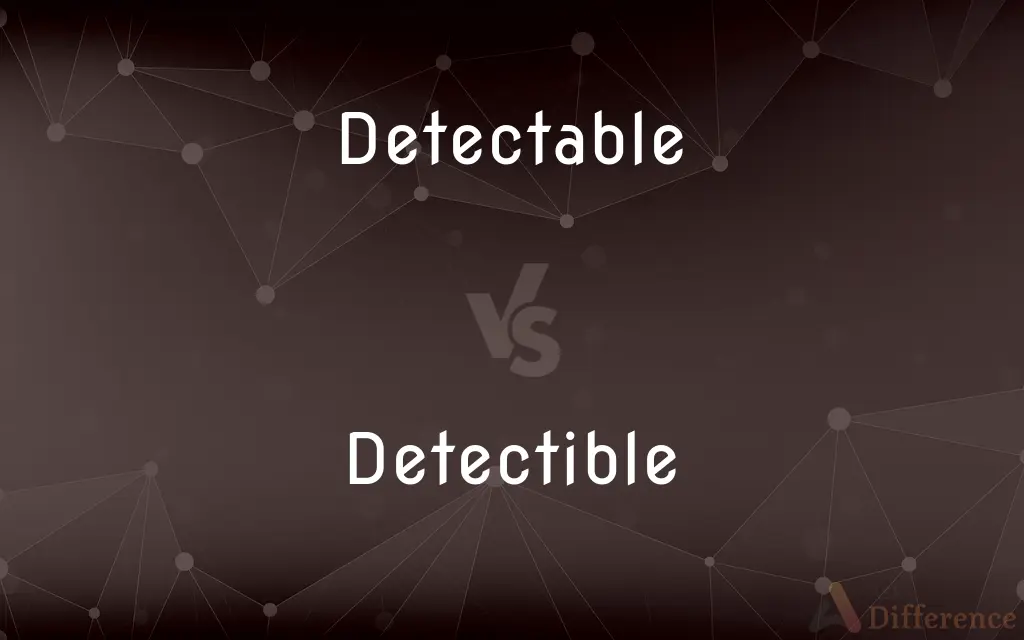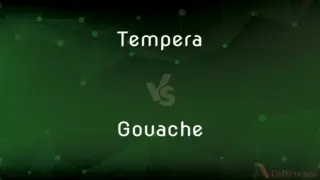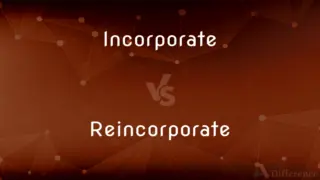Detectable vs. Detectible — What's the Difference?
Edited by Tayyaba Rehman — By Maham Liaqat — Updated on March 31, 2024
Detectable refers to something that can be discovered or noticed. Detectible is an alternative spelling, less commonly used but with the same meaning.

Difference Between Detectable and Detectible
Table of Contents
ADVERTISEMENT
Key Differences
Detectable is the more commonly used term to describe anything that can be discovered or identified through observation, testing, or any form of sensing. Detectible, while holding the same meaning, is less frequently employed in everyday language.
The selection between the two terms may depend on the writer's or speaker's preference, with detectable being the preferred choice in most contexts due to its more common usage. Both terms imply the presence of something that can be identified, whether it's a physical object, a chemical substance, a signal, or even an abstract concept that can be metaphorically 'detected' based on evidence or signs.
In scientific and technical writings, detectable is predominantly used to describe the threshold or level at which something can be identified by instruments or tests. This includes discussions about the sensitivity of detection methods, such as the detectable levels of pollutants in water or the minimum concentration of a substance required for detection by a sensor.
Despite the spelling differences, both terms are understood to convey the same concept in practical usage. They affirm the ability or potential to find or observe something, highlighting the role of detection in various fields, including science, technology, security, and health.
Comparison Chart
Definition
Able to be discovered or noticed.
Alternative spelling of detectable, same meaning.
ADVERTISEMENT
Common Usage
More commonly used in both everyday and technical language.
Less commonly used, sometimes found in specialized texts.
Contexts
Scientific research, environmental monitoring, security, health.
Similar contexts as detectable, with no difference in application.
Preference
Preferred in most written and spoken contexts for clarity and familiarity.
Used based on writer or speaker preference, less frequent.
Example Sentence
"The substance is detectable at very low concentrations."
"The signal was detectible by the specialized equipment."
Compare with Definitions
Detectable
To discover or ascertain the existence, presence, or fact of.
Detectible
To discover or ascertain the existence, presence, or fact of.
Detectable
To discern (something hidden or subtle)
Detected a note of sarcasm in the remark.
Detectible
To discern (something hidden or subtle)
Detected a note of sarcasm in the remark.
Detectable
To learn something hidden and often improper about
Detected the manager in a lie.
Detectible
To learn something hidden and often improper about
Detected the manager in a lie.
Detectable
(Electronics) To demodulate.
Detectible
(Electronics) To demodulate.
Detectable
That which can be detected, noticeable.
There was a detectable pause before he continued. We all noticed it but no one commented.
Detectible
Able to be detected.
Detectable
Capable of being detected or found out; as, parties not detectable.
Detectable
Capable of being detected;
After a noticeable pause the lecturer continued
Detectable
Easily seen or detected;
A detectable note of sarcasm
He continued after a perceptible pause
Share Your Discovery

Previous Comparison
Tempera vs. Gouache
Next Comparison
Incorporate vs. ReincorporateAuthor Spotlight
Written by
Maham LiaqatEdited by
Tayyaba RehmanTayyaba Rehman is a distinguished writer, currently serving as a primary contributor to askdifference.com. As a researcher in semantics and etymology, Tayyaba's passion for the complexity of languages and their distinctions has found a perfect home on the platform. Tayyaba delves into the intricacies of language, distinguishing between commonly confused words and phrases, thereby providing clarity for readers worldwide.














































